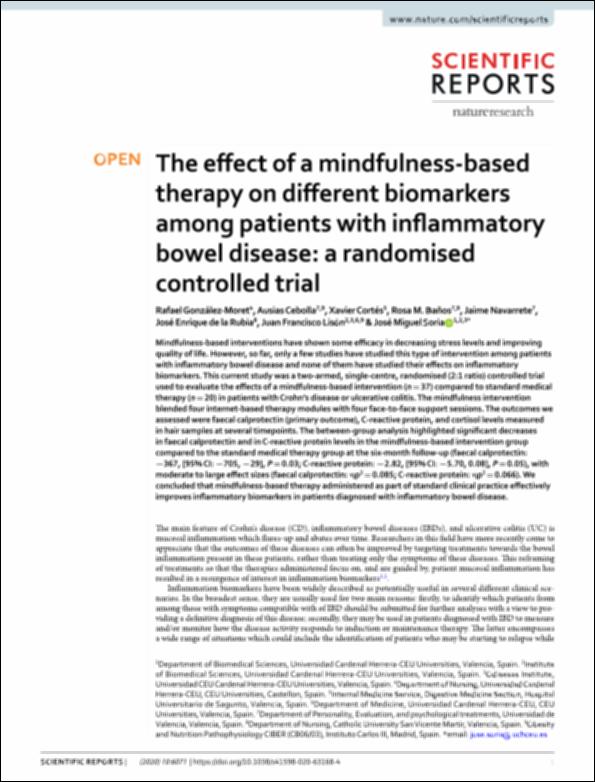Please use this identifier to cite or link to this item:
http://hdl.handle.net/10637/12648The effect of a mindfulness-based therapy on different biomarkers among patients with inflammatory bowel disease : a randomised controlled trial
| Title: | The effect of a mindfulness-based therapy on different biomarkers among patients with inflammatory bowel disease : a randomised controlled trial |
| Authors : | González Moret, Rafael Cebolla Martí, Ausiàs Cortés Rizo, Xavier Baños Rivera, Rosa María Navarrete Hidalgo, Jaime Rubia Ortí, José Enrique de la Lisón Párraga, Juan Francisco Soria López, José Miguel |
| Keywords: | Intestinos - Inflamación - Tratamiento.; Biochemical markers.; Marcadores bioquímicos.; Meditation in medicine.; Intestines - Diseases - Treatment.; Aparato digestivo - Enfermedades - Tratamiento.; Digestive organs - Diseases - Treatment.; Intestine - Inflammation - Treatment.; Meditación - Aplicaciones en medicina.; Intestinos - Enfermedades - Tratamiento. |
| Publisher: | Nature Research. |
| Citation: | González-Moret, R., Cebolla, A., Cortés, X., Baños, R.M., Navarrete, J., Rubia, J.E. et al. (2020). The effect of a mindfulness-based therapy on different biomarkers among patients with inflammatory bowel disease: a randomised controlled trial. Scientific Reports, vol. 10, art. 6071 (04 apr.). DOI: https://doi.org/10.1038/s41598-020-63168-4 |
| Abstract: | Mindfulness-based interventions have shown some efficacy in decreasing stress levels and improving quality of life. However, so far, only a few studies have studied this type of intervention among patients with inflammatory bowel disease and none of them have studied their effects on inflammatory biomarkers. This current study was a two-armed, single-centre, randomised (2:1 ratio) controlled trial used to evaluate the effects of a mindfulness-based intervention (n = 37) compared to standard medical therapy (n = 20) in patients with Crohn’s disease or ulcerative colitis. The mindfulness intervention blended four internet-based therapy modules with four face-to-face support sessions. The outcomes we assessed were faecal calprotectin (primary outcome), C-reactive protein, and cortisol levels measured in hair samples at several timepoints. The between-group analysis highlighted significant decreases in faecal calprotectin and in C-reactive protein levels in the mindfulness-based intervention group compared to the standard medical therapy group at the six-month follow-up (faecal calprotectin: −367, [95% CI: −705, −29], P = 0.03; C-reactive protein: −2.82, [95% CI: −5.70, 0.08], P = 0.05), with moderate to large effect sizes (faecal calprotectin: ηp2 = 0.085; C-reactive protein: ηp2 = 0.066). We concluded that mindfulness-based therapy administered as part of standard clinical practice effectively improves inflammatory biomarkers in patients diagnosed with inflammatory bowel disease. |
| Description: | Este artículo se encuentra disponible en la siguiente URL: https://www.nature.com/articles/s41598-020-63168-4.pdf |
| URI: | http://hdl.handle.net/10637/12648 |
| Rights : | http://creativecommons.org/licenses/by/4.0/deed.es |
| ISSN: | 2045-2322 (Electrónico). |
| Issue Date: | 8-Apr-2020 |
| Center : | Universidad Cardenal Herrera-CEU |
| Appears in Collections: | Dpto. Medicina y Cirugía |
Items in DSpace are protected by copyright, with all rights reserved, unless otherwise indicated.


